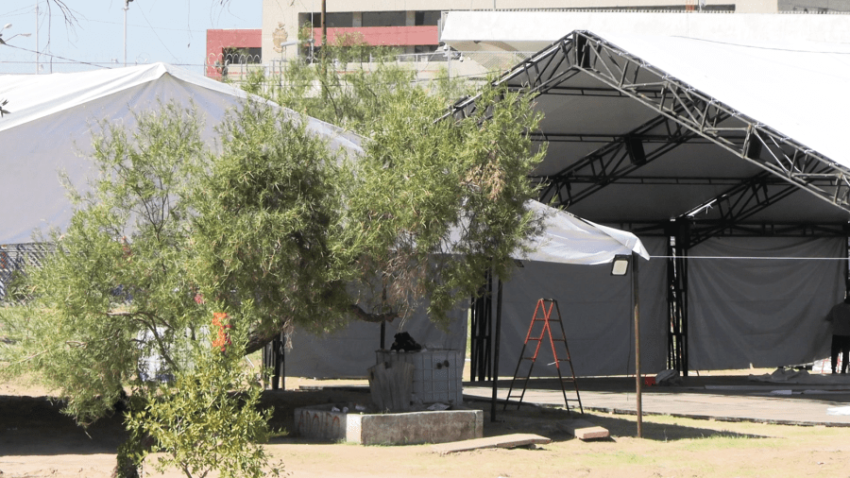JUAREZ, Mexico (Border Report) – White canvass tents to a new temporary migrant shelter are going up in north Juarez within sight of the U.S. border wall.
The facility is the Mexican government’s response to a recent surge of asylum seekers intent on staying along the Rio Grande until being allowed to approach the wall on the American side.
The tents will house homeless migrants, families waiting for confirmation of an appointment at a U.S. port of entry, and foreign nationals intercepted by Mexican immigration authorities while riding cargo trains to the border, Juarez Mayor Cruz Perez Cuellar said.
“Migrants are still arriving (to the border), but the flow is lower compared to previous days,” Perez Cuellar said on Monday. “(It’s) to prevent them from being on the river. There, decisions will be made: Some may go to shelters, others may be returned, and others may get their (U.S. Customs and Border Protection) appointments there. It will give us better control over what’s going on.”
Thousands of migrants from South and Central America arrived in Juarez on cargo trains a few days ago and tried to enter the U.S. through Gate 36 of the South Central El Paso border wall. The situation prompted closed-door binational meetings, increased train checks in Northern Mexico, and a show of force by federal, state, and municipal police forces south of the river.
Perez Cuellar said the police presence was “preventive” and “dissuasive” in nature, but no migrants were taken into custody. The new shelter, he said, will spare them futile waits on the river and the dangers of running through highway traffic to get to the wall, he said.
The mayor said the shelter a few blocks east of Juarez City Hall opens on Tuesday.
However, migrants Border Report spoke to on Monday said they have no plans to use the shelter, and residents of nearby neighborhoods don’t want it there.
“They already had a shelter there once, and they left it littered with garbage, clothes, and excrement. We go out early to walk and it stinks. My neighborhood is a dump,” said retired schoolteacher Maria Oralia Favela, a resident of Colonia Hidalgo.
Favela said she and her neighbors are fed up with migrants coming and going through their streets like never before the past four years.
“The clothes they give them, they throw away. They have their children on corners begging. When it gets dark, they go get them. People from the U.S. come with boxes of pizzas and give them $5 and $10. They don’t want to work; they want everything handed out to them,” the retired teacher said.
Favela said she and her neighbors are fed up with migrants coming and going through their streets like never before in the past four years.
“The clothes they give them, they throw away. They have their children on corners begging. When it gets dark, they get them. People from the U.S. come with boxes of pizzas and give them $5 and $10. They don’t want to work; they want everything handed out to them,” the retired teacher said.
Favela, the new shelter, will only exacerbate the situation.
Brayan Delgado, a Venezuelan migrant who came to Juarez four days ago riding a Mexican cargo train, said the migrants resort to begging only because people here won’t give them jobs.
“If we want to work, they won’t let us work. If we beg, they don’t like it. I don’t know if they feel hatred for us, or xenophobia. If someone is willing to work, let him work,” Delgado said.
The native of Caracas said he wants to live in the United States because sympathizers of the Nicolas Maduro regime targeted him after participating in an anti-government protest. He said the recent Mexican crackdown on trains only lasted three days. During that time, he and many other migrants camped in the desert until the government-run rail company eased the pressure, and they could complete their trek to Juarez.
Delgado said he doesn’t understand why people in Mexico don’t like Venezuelans when many Mexicans have crossed the border between ports of entry for decades. “Mexicans have an American Dream. We, too, have a right to have an American Dream,” he said about criticism from the locals.
As for the new shelter, Delgado said he wants to go to the United States as soon as possible, not stay in Mexico.
Vicente Peña Herrera, from Ecuador, said he has nothing to say but good things about Mexicans, who have shown solidarity for him, his wife, and their two children during their five-week stay here.
But he said they won’t be moving into the tents.
“Nobody bothers us here, and we don’t bother anyone,” Pena said while resting in the parking lot of a convenience store in north Juarez. The shelter “will be full in one or two days, and it will be like being on the street. If my children are not cold, I will wait for my (CBP) appointment out here.”
Pena said he did not consider rushing the border wall like so many migrants in Juarez did at the end of September. “I don’t want to be deported until I get my appointment,” he said, adding that he crossed alone between ports of entry earlier this year and got expelled through Brownsville, Texas-Matamoros, Mexico.
This time, he’s hoping things will be different because he’s coming with his family.
“There is too much crime, too many bad things (in Ecuador). I don’t want my children to go through that. I plan to work hard. We’re going to Chicago, if possible; if not, wherever God takes us,” he said.
Read: Read More




